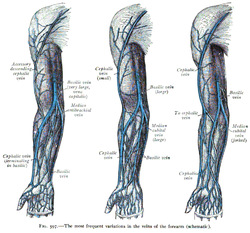Basilic vein
| Basilic vein | |
|---|---|
 Superficial veins of the upper limb. | |
 The most frequent variations of the veins of the forearm (schematic). | |
| Details | |
| Source | Dorsal venous network of hand |
| Drains to | Axillary vein |
| Identifiers | |
| Latin | Vena basilica |
| TA98 | A12.3.08.018 |
| TA2 | 4979 |
| FMA | 22908 |
| Anatomical terminology | |
The basilic vein is a large superficial vein of the upper limb that helps drain parts of the hand and forearm. It originates on the medial (ulnar) side of the dorsal venous network of the hand and travels up the base of the forearm, where its course is generally visible through the skin as it travels in the subcutaneous fat and fascia lying superficial to the muscles.
Near the region anterior to the cubital fossa, in the bend of the elbow joint, the basilic vein usually connects with the other large superficial vein of the upper extremity, the cephalic vein, via the median cubital vein (or median basilic vein). The layout of superficial veins in the forearm is highly variable from person to person, and there is a profuse network of unnamed superficial veins that the basilic vein communicates with.
As it ascends the medial side of the biceps in the arm proper (between the elbow and shoulder), the basilic vein normally perforates the brachial fascia (deep fascia) above the medial epicondyle, or even as high as mid-arm. There, around the lower border of the teres major muscle, the anterior and posterior circumflex humeral veins feed into it, just before it joins the brachial veins to form the axillary vein.
Along with other superficial veins in the forearm, the basilic vein is an acceptable site for venipuncture. Nevertheless, IV nurses sometimes refer to the basilic vein as the "virgin vein," since with the arm typically supinated during phlebotomy the basilic vein below the elbow becomes awkward to access, and is therefore infrequently used.
Vascular surgeons sometimes utilize the basilic vein to create an AV (arteriovenous) fistula or AV graft for hemodialysis access in patients with renal failure.
Additional images
-
Cross-section through the middle of upper arm
-
Cross-section through the middle of the forearm.
| Dissection images |
|---|
|
See also
External links
- Anatomy photo:07:st-0701 at the SUNY Downstate Medical Center
- Radiology image: UpperLimb:18VenoFo from Radiology Atlas at SUNY Downstate Medical Center (need to enable Java)
- Illustration

















